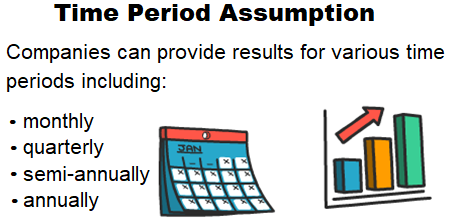Time period assumption
Definition and explanation
The time period assumption (also known as the periodicity assumption and accounting time period concept) states that the life of a business can be divided into equal time periods. These time periods are known as accounting periods, for which companies prepare their financial statements to be used by various internal and external parties and stakeholders.

The length of the accounting period to be used for the preparation of financial statements depends on the nature and requirements of each business as well as the needs of the users of its financial statements. Normally, an accounting period consists of a month, quarter, six months, or a year, depending on the needs of the business entity and its stakeholders.
Importance of time period assumption
The time period assumption enables both trading and non-trading organizations to stop and see how successful they have been in achieving their core objectives during a particular period of time and where the room for improvement still exists.
Stakeholders and other users of financial statements continuously need current and reliable information to evaluate the financial performance and position of the companies they are linked to. This information helps them make important short- and long-term economic decisions and take actions accordingly. The time period assumption enables companies to divide their economic activities into shorter time periods. For each such period, companies can prepare and publish a set of financial statements to meet the needs of their stakeholders and other users. The time period for which a financial statement is prepared is generally shown in the last line of its heading.
The income statement tells interested parties how profitably the company has carried out its operations during the reporting period, and the balance sheet discloses the financial position of the business at the end of the period. The statement of cash flows exhibits all the reasons that cause inflows and outflows of cash and cash equivalents during the period, and the statement of retained earnings reveals what portion of the company’s profit has been distributed among its owners and what portion has been kept in the business for other purposes, like future growth and meeting debt obligations, etc.
All this information is very important for internal management, both actual and potential investors, creditors, government agencies and other users of financial statements to decide what to do and what not to do in near and long-term future. The time period assumption facilitates the provision of latest, relevant and reliable financial information to all these parties for making accurate economic and other decisions in a timely manner.
Examples
Let’s take a couple of examples to further demonstrate the concept.
Example 1
Meta Company provides services worth $2,500 to Beta Company during the first quarter of the year. Beta will pay the cash to Meta for these services next quarter. According to the time period assumption, if Meta prepares its financial statements at the end of the first quarter of the year, it must include this service revenue of $2,500 in its income statement for the first quarter.
Example 2
Meta Company incurs expenses of $1,200 during the first quarter of the year. The cash for these expenses will be paid next quarter. The time period assumption requires Meta to disclose these expenses on the income statement for the first quarter of the year.
Notice that the two examples given above indicate that the time period assumption is closely related to the matching principle and the revenue recognition principle of accounting.

Leave a comment